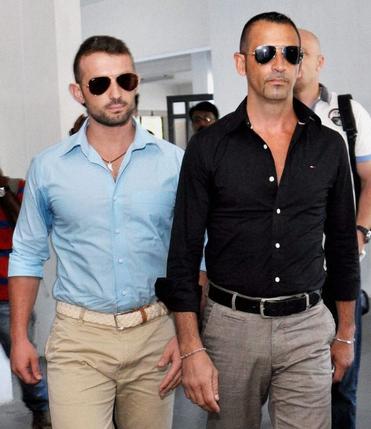NEW DELHI, March 22, 2013
As a three-car cavalcade, headed by the Ambassador’s limousine, carrying the Italian marines accused of killing two Indian fishermen swept into the Italian Embassy on Friday evening, an unprecedented diplomatic chapter in India-Italy ties seems to have drawn to a close.
Accompanied by Italian Deputy Foreign Minister Steffan de Mistura, the marines, Massimiliano Latore and Salvatore Girone, landed in Delhi on a military plane hours before the end of the March 22 deadline for their return and dodged a full complement of media personnel camped outside the international airport since the morning.
Speaking to The Hindu, External Affairs Minister Salman Khurshid said the Italian government on Thursday morning had sent a message via the Indian charge d’affaires in Rome, Ravi Shankar, seeking assurances that the marines would not be arrested upon their return or run the risk of being given the death penalty in the event of their conviction by an Indian court. Mr. Khurshid and his colleagues, Foreign Secretary Ranjan Mathai and Secretary (West) Sudhir Vyas, knew immediately that an end to the crisis was at hand. “We quickly put our heads together and a formal assurance was relayed yesterday [Thursday] at the level of Secretary (West),” Mr. Khurshid said, adding: “I ensured we had the Attorney-General on board on this.”
Prime Minister Manmohan Singh welcomed Italy’s decision to send back the marines saying that he was happy the integrity and dignity of the Indian judicial process had been upheld. Earlier, after Italy had declared that it would not be sending back the marines, Dr. Singh had termed this volte-face as “unacceptable” and warned that there would be “consequences.”
“The Italians watched our determination. They saw our statements. These were not hostile but firm messages. They saw the attitude of the Supreme Court. And I think the fact that the European Union statement [which called for the Italian ambassador’s diplomatic immunity to be respected] also said the two countries should sort the issue out helped Italy to reach its decision.”
But India also had an obligation, Mr. Khurshid said. “What we owe to Italy is that the special court [which the Supreme Court ordered to hear the case] must be notified and should start functioning quickly.”
Asked if Italy had raised that as a condition for returning the marines, Mr. Khurshid said that he himself had brought up the matter with Steffan di Mistura. “I told him that a speedy trial is not your concern alone but ours too.”
Mr. Khurshid told The Hindu that many people outside and even within the government wanted India to break off all relations and contact with the Italians but the government had decided to stay in touch and find a diplomatic way out. “We withheld our ambassador [designate] but there was constant communication. It takes minutes to break a relationship,” he said. “Building it takes time.”
A senior Indian MEA official speaking on condition of anonymity said it was hard to understand why the Ministry of Home Affairs had not acted to set up the special court despite the passage of more than six weeks. He also said the reason the Italians wanted a specific assurance on the death penalty was because of the popular perception in Europe that India had gone back on the guarantees it gave a Portuguese court at the time of his extradition from Lisbon in 2005 that he would not be liable for capital punishment.
Describing the Indian government’s approach to the crisis over the return of the two marines as an “exercise in degrees of patience,” the official said India was “dealing with a very charged atmosphere and had to proceed with a lot of caution; this was not a purely diplomatic problem since the Supreme Court was involved.”
On both sides the room for manoeuvre was not very great, he said. “I think in Italy they realised that violating the undertaking given to the Supreme Court could not be brushed aside lightly. Since they had got their ambassador to implead himself, there was some amount of discomfort.” The MEA played a role in sensitising the EU to India’s stand, the official said, adding that High Representative Catherine Ashton’s recent statement on diplomatic immunity — which many in India saw as a warning to New Delhi — also sent a signal to Italy that its European partners wanted a diplomatic way out of the crisis.
At a press conference in Delhi on Friday night, Steffan di Mistura underlined the Indian assurance on the death penalty and stressed the need for a quick and “effective” disposal of the case by the special court. He also reiterated the Italian position that under international law, the matter should be tried in Italy, adding that during their month-long sojourn in Italy, the two marines were questioned by Italian judges about the shooting incident.
(SANDEEP DIKSHIT| HINDU)


